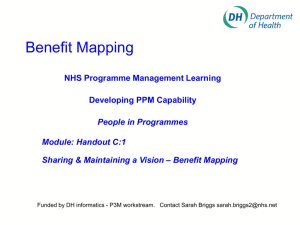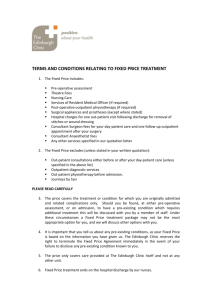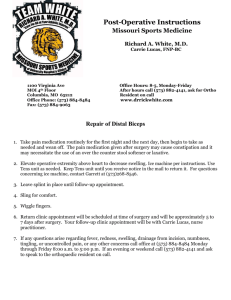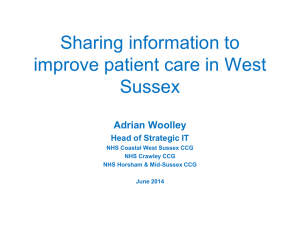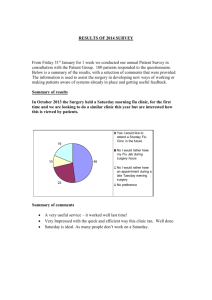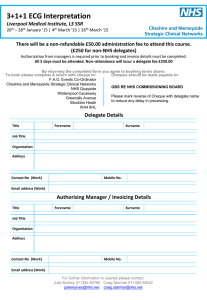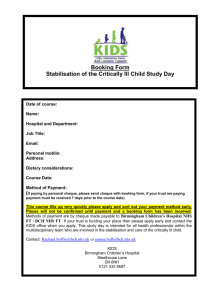Local Patients Access Policy
advertisement
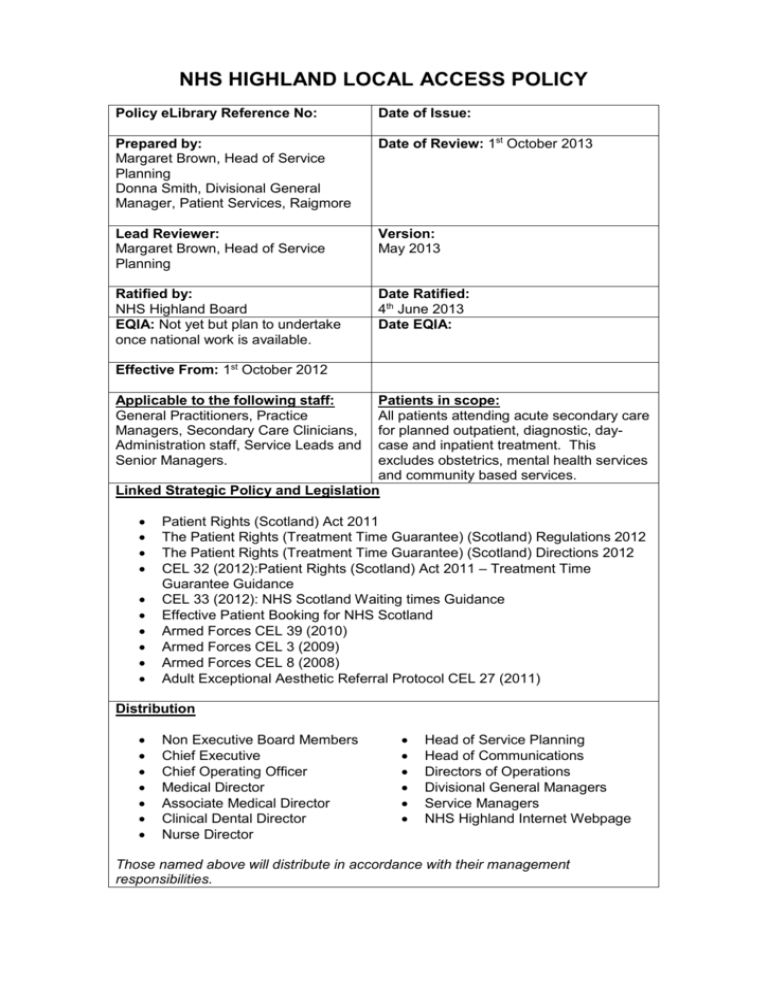
NHS HIGHLAND LOCAL ACCESS POLICY Policy eLibrary Reference No: Date of Issue: Prepared by: Margaret Brown, Head of Service Planning Donna Smith, Divisional General Manager, Patient Services, Raigmore Date of Review: 1st October 2013 Lead Reviewer: Margaret Brown, Head of Service Planning Version: May 2013 Ratified by: NHS Highland Board EQIA: Not yet but plan to undertake once national work is available. Date Ratified: 4th June 2013 Date EQIA: Effective From: 1st October 2012 Applicable to the following staff: General Practitioners, Practice Managers, Secondary Care Clinicians, Administration staff, Service Leads and Senior Managers. Patients in scope: All patients attending acute secondary care for planned outpatient, diagnostic, daycase and inpatient treatment. This excludes obstetrics, mental health services and community based services. Linked Strategic Policy and Legislation Patient Rights (Scotland) Act 2011 The Patient Rights (Treatment Time Guarantee) (Scotland) Regulations 2012 The Patient Rights (Treatment Time Guarantee) (Scotland) Directions 2012 CEL 32 (2012):Patient Rights (Scotland) Act 2011 – Treatment Time Guarantee Guidance CEL 33 (2012): NHS Scotland Waiting times Guidance Effective Patient Booking for NHS Scotland Armed Forces CEL 39 (2010) Armed Forces CEL 3 (2009) Armed Forces CEL 8 (2008) Adult Exceptional Aesthetic Referral Protocol CEL 27 (2011) Distribution Non Executive Board Members Chief Executive Chief Operating Officer Medical Director Associate Medical Director Clinical Dental Director Nurse Director Head of Service Planning Head of Communications Directors of Operations Divisional General Managers Service Managers NHS Highland Internet Webpage Those named above will distribute in accordance with their management responsibilities. 1. PURPOSE OF THE POLICY The NHS Highland access policy aims to ensure: Patients’ interests are paramount and that they are provided with clear, accurate and timely information at each stage in their pathway. Consistency of approach in providing access to acute secondary services. Efficient and effective receipt, triage and onward management of referrals received. Robust waiting list management to take cognisance of clinical need, length of wait and national waiting time standards. The booking process consistently applies the principles of effective patient focused booking practice to all new and return outpatient appointments and diagnostic appointments. Efficient management of patients changed appointments and failures to attend. All of the above are in line with the Patient Rights (Scotland) Act 2011 and all relevant national guidance and regulations (detailed in the policy header). These support the national ambition to deliver person centred, safe and effective healthcare services, and our local mission to improve the quality of our care to every person every day. An expanded version of this document is under development, detailing the operational procedures and reports that are in place to support the delivery and performance monitoring/management of this policy. 2. CONTENTS The policy has been structured around the patient’s pathway and has been divided into the following sections. Referral to Acute Secondary Care Services Referral Management Waiting List Management Booking Attendance Communication 3 REFERRAL TO ACUTE SECONDARY CARE SERVICES 3.1 All General Practitioner referrals will be submitted electronically via the SCIgateway. All referrals will be “open” referrals (Dear Dr) unless there is a clear requirement for a sub-specialty or in the interest of continuity of care. In these limited number of instances referrals will be to a named clinician. 3.2 All Independent Practitioner referrals (e.g. General Dental Practitioners, Optometrists etc) will be submitted manually. This will continue until national access to the SCI-Gateway system is secured. Appendix 1 details the requirements for manual referral. 3.3. All Consultant referrals to a Secondary Care Consultant will be submitted electronically within NHS Highland. 3.4 Referrals from the National Screening Programmes (Cervical, Bowel and Aneurism) will be submitted electronically via the SCI-gateway. Patients from the Breast Screening Programme will be referred following assessment at the Breast MultiDisciplinary Team. 3.5 All referrals for patients who have attended an Emergency Department, Minor Injury Unit or walk -in centre and require access to planned care will be submitted electronically. 3.7 Patient self referrals will not be accepted for new episodes of consultant-led care. The Local Access Policy will be revised to include a policy statement regarding referrals from Allied Health Professionals once the current relevant national reviews are completed. Until then existing practice will continue. 4. REFERRAL MANAGEMENT 4.1 All referrals marked urgent or urgent suspected cancer (USC) will be clinically triaged daily. 4.2 All Urgent Suspected Cancer referrals will be automatically extracted from the ISoft system onto the Cancer Tracking Tool and the patient’s journey monitored by the Cancer Patient Pathway Co-ordinators in accordance with the Cancer Waiting Times Management procedures. 4.3 All other referrals will be clinically triaged and returned to the Booking Service within 7 days. Routine referrals may be upgraded to Urgent/USC following triage. 4.4 Any referrals identified as avoidable by the triage clinician will be returned to the referring clinician detailing the reasons behind the decision within 7 days. 4.5 The outcome of the triage process will be recorded electronically within 24 hours of the completion of clinical triage. With the implementation of the new patient management system planned to be introduced in October 2013 the aim will be to update this policy to state that all referrals are triaged electronically. This will require the development of a interface between NHS GG&C and NHS Highland new PMS system if this is be available within Argyll and Bute. 5 WAITING LIST MANAGEMENT 5.1 The decision to add a patient to the waiting list must be made by an appropriately qualified clinician. Patients must be fit, willing and available to attend hospital before they are added to the waiting list. 5.2 All patients should be admitted on day of procedure unless clinically inappropriate. 5.3 Day surgery will be assumed unless there is a clinical indication for the patient to be treated as an inpatient. 5.4 All patients, with the exception of minor procedures, will have a completed preoperative assessment prior to addition to the waiting list. The start of the waiting time for the Treatment Time Guarantee will be the date the patient and consultant agreed the treatment, usually the date of the outpatient clinic, regardless of when the preoperative assessment is undertaken. 5.5 If a patient is unavailable to attend hospital for appointment or treatment for any period(s) of time, this will be recorded on the waiting list. Their calculated waiting time against any relevant waiting times target will not include the period(s) that they are unavailable. There are 2 main categories of unavailability – Medical and Patientadvised. 5.5.1 Medical unavailability will only be applied where a registered medical practitioner has advised that the patient has another medical condition that prevents the agreed treatment from proceeding at that time. 5.5.2 Patient-advised unavailability is any period advised by the patient that they are unavailable for appointment or treatment. This will be recorded as one of the nationally agreed categories detailed in Appendix 2. 5.5.3 Patient advised unavailability – “Visiting Consultant Service” will be applied where a patient waiting for an outpatient or a diagnostic appointment chooses to wait longer than their guarantee date to be seen at a scheduled clinic nearer their home, rather than travel to a main Highland hospital (or one in NHS Greater Glasgow & Clyde for Argyll & Bute residents) and be seen by their guarantee date. The patient advised unavailability will be applied from the earliest date available to the patient to the date of the appointment at their preferred site. A full schedule of the specialities available at each NHS Highland facility is detailed in Appendix 5. 5.5.4 Any patient with unavailability applied will be reviewed within 12 weeks of the start of the unavailable period, and every 12 weeks thereafter, where applicable. 5.5.5 No open-ended periods of unavailability, either for patient-advised or medical, will be applied to patients on the waiting list. If the end date is unknown, then a maximum of 12 weeks should be recorded as the end date, at which point the situation will be clinically reviewed. 5.5.6 No unavailability will be applied to any patient who has passed their Treatment Time Guarantee date. Any notified periods of unavailability will be recorded for booking purposes but will not affect their waiting time calculation. 5.6 Patients can only be removed from the waiting list on the advice of an appropriately qualified medical practitioner within the relevant specialty. Following a removal, written communication confirming the removal must be sent to the patient (or the patient’s carer) and the referring clinician, detailing the reasons for the removal. 6. BOOKING 6.1 Booking - Outpatient and Diagnostic Services There are currently three methods of booking outpatient appointments in NHS Highland. The Patient Focused Booking method is where a letter is sent to a patient inviting them to make contact to make suitable arrangements for their appointment. The “Written-Offer” method is where a patient is sent a letter offering them an appointment date and the acceptance of that date is assumed unless the patient makes contact to advise us that it is not suitable. The Telephone Booking method is where arrangements for the appointment are made by telephoning the patient. This method is most commonly used where there are very short waiting times such as in Diagnostic Services, short notice appointments, or for clinically urgent patients. Policy 6.1.1 To migrate all outpatients currently booked using the “Written-Offer” method to the Patient Focused Booking method. 6.1.2 To roll out the option of a reminder and confirmation service for all booked appointments more than 7 days in advance. 6.1.3 An agreed template is in place for every clinic which must be reviewed annually. 6.1.4 All planned clinics will be notified to the relevant booking service no later than 6 weeks before the clinic is planned. 6.1.5 All patients managed through the patient focused booking method will received their initial contact letter no later than 3 weeks after the receipt of the initial referral. Failure to respond within 7 days will result in the issue of a second contact letter. Failure to respond to the second within a further 7 days will result in a clinical review of the appropriateness of removal from the waiting list. Patient-advised unavailability will be applied from the date that the second letter is sent to the date the patient makes contact with the service, or the date that the patient is removed from the waiting list. This is the only instance when unavailability will be applied retrospectively. 6.1.6 All patients will be made a reasonable offer of appointment for acute secondary care specialities available within NHS Highland, detailed in Appendix 3. An offer will be deemed reasonable if all of the following conditions are met: The offer consists of two or more different dates with a minimum of 7 days notice from the date each offer of appointment is made. Patient’s contacted using the Written Offer method of booking will be assumed to have accepted the first offer if they have not made contact within 14 days to notify the service that it is not suitable. The appointment is located at any appropriate healthcare facility within the boundary of NHS Highland or at the Golden Jubilee National Hospital. For Argyll and Bute residents, the location will also be deemed reasonable within the boundaries of NHS Greater Glasgow and Clyde. In exceptional circumstances locations in NHS Greater Glasgow and Clyde, NHS Grampian and NHS Lothian; and the independent sector will also be deemed as reasonable for any NHS Highland resident. E.g. significant loss of local facilities or long term consultant vacancies that cannot be covered. The Board will be formally notified if any these exceptional circumstances occur and locations deemed as reasonable will be pulled back to the normal definition as soon as local services can be reinstated. This supports the national guidance expectation that Boards take account of the policy of providing and protecting local services as much as possible. The appointment is to be undertaken by any competent clinician who is part of the consultant-led service within the appropriate specialty. 6.1.7 If a patient refuses a reasonable offer on the grounds of date, location or Consultant, they will be clinically reviewed and based on this decision either referred back to their referring clinician or a further offer may be made meeting the patient’s preference. In this instance, unavailability will be applied from the date of the original offer until the date of the patient’s preference. Refusal of a short notice offer does not affect the patients waiting time. 6.1.8 A minimum of 6 weeks’ notice is required for clinic changes related to annual leave, study leave and special leave. Any exceptions to this must be authorised electronically by the appropriate Senior Manager. 6.1.9 All patients affected by cancellation of a clinic will be notified in writing if the hospital is providing 1 week or more notice of the cancellation or by telephone if it is less than this. Every attempt will be made to offer the patient an alternative prior to their guarantee date. 6.1.10 A patient who having accepted a reasonable offer of appointment, then gives the hospital more than 24 hours notice that they cannot attend, will be recorded as “cannot attend” (CNA) and have their waiting time reset to zero from the date of notification. They will be offered an alternative date within their revised guarantee time, where it is reasonable and clinically appropriate to do so. Any patient, who notifies on three occasions that they cannot attend, having accepted a reasonable offer, will be clinically reviewed and either removed from the waiting list or offered an alternative date. 6.1.11 A patient who having accepted a reasonable offer of appointment, then gives the hospital less than 24 hours notice that they cannot attend, will be recorded as “did not attend” (DNA) and will be managed as described in Section 7.1. 6.2 Booking - Admissions There are currently two methods of booking admissions in NHS Highland. The “Written-Offer” method is where a patient is sent a letter offering them an admission date. Patients are advised to make contact to confirm their acceptance of the offered date or to agree an alternative. The Telephone Booking method is where arrangements for the admission are made by telephoning the patient. This method is most commonly used where arrangements are made within a very short timescale such as short notice cancellations, or for clinically urgent patients. Policy 6.2.1 To introduce a reminder system for patients who have not responded to a written offer. 6.2.2 To roll out a reminder and confirmation service for all booked admissions more than 7 days in advance. 6.2.3 All planned routine admissions will be notified to the waiting list team no later than 3 weeks before the admission is planned. All urgent patients will be notified at the earliest opportunity. 6.2.4 All patients will be made a reasonable offer of admission for acute secondary care specialities available within NHS Highland, detailed in Appendix 3. An offer will be deemed reasonable if all of the following conditions are met: The offer consists of two or more different dates with a minimum of 7 days notice from the date each offer of appointment is made. 7 days notice will be given if a verbal offer is made and 14 days notice will be given if a written offer is made. Both dates must be prior to the patient’s Treatment Time Guarantee date. The admission is to any appropriate healthcare facility offering the service within the boundary of NHS Highland or at the Golden Jubilee National Hospital. For Argyll and Bute residents, the location will also be deemed reasonable within the boundaries of NHS Greater Glasgow and Clyde. In exceptional circumstances locations in NHS Greater Glasgow and Clyde, NHS Grampian and NHS Lothian; and the independent sector will also be deemed as reasonable for any NHS Highland resident. E.g. significant loss of theatre or bed capacity; long term consultant vacancies that cannot be covered. The Board will be formally notified if any these exceptional circumstances occur and locations deemed as reasonable will be pulled back to the normal definition as soon as local services can be reinstated. This supports the national guidance expectation that Boards take account of the policy of providing and protecting local services as much as possible. The admission is to be undertaken by any competent clinician who is part of the consultant-led service within the appropriate specialty. This may not be the same clinician who carried out the outpatient assessment. 6.2.5 If a patient refuses a reasonable offer on the grounds of date, location or Consultant, they will be clinically reviewed and based on this decision either referred back to their referring clinician or a further offer is made meeting the patient’s preference, although this cannot be guaranteed for any patient. In this instance, the relevant patientadvised unavailability code will be applied from the date of the original offer until the date of the patient’s preference. 6.2.6 Any admission cancelled by the hospital will result in the patient being notified in writing if the hospital is providing 1 week or more notice of the cancellation or by telephone if it is less than this. Every attempt will be made to offer the patient an alternative prior to their guarantee date. 6.2.7 A patient who having accepted a reasonable offer of admission, then giving the hospital more than 24 hours notice that they cannot attend, will be recorded as “cannot attend” (CNA) and have their waiting time reset to zero from the date of notification. They will be offered an alternative date within their revised guarantee time, where it is reasonable and clinically appropriate to do so. Any patient who notifies on three occasions that they cannot attend will be clinically reviewed and either removed from the waiting list or offered an alternative date. 6.2.8 A patient who having accepted a reasonable offer of admission, then giving the hospital less than 24 hours notice that they cannot attend, will be recorded as “did not attend” (DNA) and will be managed as described in Section 7.1. 7. ATTENDANCE 7.1 Any patient who fails to attend on the day of their outpatient appointment or agreed admission date or provides less than 24 hours prior to their agreed time will be deemed to have failed to attend their appointment i.e. Did Not Attend (DNA). Every patient who is classified as a DNA and had a reasonable offer of appointment will be reviewed by the clinician and will either:a) Be offered a further appointment and have their clock reset to zero, where it is reasonable and clinically appropriate to do so, OR b) Be removed from the waiting list and be notified of this together with their referring clinician. For under 16’s and vulnerable adults, communication will follow the GIRFEC (Getting it Right for Every Child) procedure. The exception to this is that a clinician may choose to not reset the clock of a patient who requires urgent treatment. 7.2 A blue clinic outcome form will be completed at the end of every outpatient consultation by the responsible clinician. Information captured on this form will be input to the patient administration system within 24 hours of the consultation (Monday – Friday). 7.3 Any patient, either outpatient or admission, where a follow up appointment is identified as being required within 6 weeks should be processed prior to the patient leaving the hospital. Any patient, either outpatient or admission, where a follow up appointment is identified as being required after 6 weeks should be added to an electronic waiting list. 7.4 Any patient whose consultation or treatment does not take place as planned will be managed as follows:7.4.1 Hospital cancellation due to facility or resource constraint – the patient will be issued an agreed alternative date before leaving the hospital. The reason for the cancellation will be recorded on the patient administration system and there will be no clock adjustment to the patients waiting time. 7.4.2 Hospital cancellation due to patient’s fitness for treatment – The reason for the cancellation will be recorded on the patient administration system and medical unavailability will be applied to the patient’s waiting list record in accordance with the Standard Operating Procedure. 7.4.3 Patient has registered their arrival for an outpatient appointment but then cannot wait to be seen – If the clinic is running late and the appointment has been delayed longer than the patient could reasonably be expected to wait, then this will be recorded as a hospital cancellation and managed as detailed in 7.4.1. If there is a minor delay, and the patient is notified of this on arrival, but is not willing to wait a short period of time, then this will be recorded as a CNA (could not attend) and managed as detailed in 6.1.10. 7.4.4 Patient/carer/responsible adult refuses planned treatment on admission – Clinician led discussion will decide on whether the patient will be removed from the waiting list as no longer wishing treatment or will have “patient advised unavailability – indefinite unavailability” applied to allow them to consider whether to proceed. This will be managed as described in Section 5.5.5. 8. COMMUNICATION 8.1 Communication from Patients 8.1.1 Patients should inform their GP/GP Practice of any changes to their registration information (Appendix 4). 8.1.2 Patients on a waiting list for consultation or treatment should inform the hospital of any periods of known unavailability as soon as possible. 8.1.3 Patients should inform the hospital with as much notice as possible if they cannot attend an appointment or an agreed admission date. 8.1.4 Patients who no longer wish to have their outpatient appointment or admission should advise their GP, the hospital and the Scottish Ambulance Patient Transport Service, if transport has been arranged. 8.2 Communication to Patients Patients will receive communication in accordance with national legislation CEL 32 (2012) and CEL 33 (2012). NHS Highland will advise Treatment Time Guarantee patients (or where appropriate the patient’s carer) in writing when: The patient is eligible for the Treatment Time Guarantee; The patient has advised us that they are unavailable for treatment for a known period, noting the start and end date of that period and, where appropriate, noting the anticipated date when the patient will be reviewed; The patient has refused two or more reasonable offers of an appointment; The patient does not attend an agreed appointment and has not given the health board reasonable notice of this (Did Not Attend); The patient has accepted a reasonable offer of appointment but then has on three or more occasions cancelled an appointment (Could Not Attend); The patient has been removed from the waiting list, for example, because the patient Did Not Attend or Could Not Attend; To confirm the patient’s request to be treated in a different Health Board We are unable to meet the Treatment Time Guarantee within NHS Highland. It is planned to develop system capability to allow this communication to be sent electronically or by traditional post depending on the patient’s preference. APPENDIX 1 : GUIDELINES FOR MANUAL REFERRAL 1. Referral information should be accurate, clinically relevant, timely and complete. 2. Patient’s up to date information (Name, contact address, Date of Birth, Community Health Index (CHI), telephone numbers including Mobile, and e-mail, should be provided. 3. It should be clear what is being sought e.g. Clinical opinion, diagnosis, advice on management etc. 4. A concise summary of all relevant clinical information. 5. It should include details of any investigations carried out, any treatment provided or started, together with the outcomes of any treatment. 6. Referrer’s assessment of the level of Clinical Urgency. 7. The patient’s willingness to be seen at short notice (within days). 8. Any period(s) of known unavailability by patient. 9. When referring patients who cannot understand or give consent for their own treatment, the referrer must provide details of who has the ability to act on behalf of the patient. 10. Referrers should identify any special communication or other requirements their patients may have and detail these on the referral letter (e.g. literacy problems, learning difficulties, communication difficulties, need for interpretation services, religion (if linked to treatment), or other special requirements. Any other issues to support equality and diversity should be highlighted. APPENDIX 2 : PATIENT ADVISED UNAVAILABILITY Nationally agreed categories Patient Advised - on holiday Patient Advised - personal commitment Patient Advised - work commitment Patient Advised - carer commitment Patient Advised - academic commitment Patient Advised - jury duty Patient Advised - wishes named Consultant Patient Advised - wishes to be treated within local Health Board Patient Advised - ‘Visiting Consultant Service’ – wishes to be seen at next scheduled service within Health Board of residence Patient Advised - following severe weather cancellation of Visiting Consultant Service, wishes to be treated within local Health Board Patient Advised - indefinitely unavailable APPENDIX 3 : SPECIALITIES AVAILABLE WITHIN NHS HIGHLAND Highland Based Services Speciality General Medicine Dermatology Endocrinology & Diabetes Endocrinology Gastroenterology Diabetes Northern Highland Admissions Outpatients Yes Yes Yes Yes admitted Yes under Yes General Yes Medicine Geriatric Medicine Renal Medicine Cardiology Paediatrics Neurology Rehabilitation Medicine Respiratory Medicine Rheumatology General Surgery Vascular Surgery Oral and Maxillofacial Surgery Pain Management Ear, Nose & Throat (ENT) Ophthalmology Trauma & Orthopaedic Urology Community Dental Practice Gynaecology Clinical Oncology Haematology Yes Yes Yes Yes Yes Yes Yes Yes Yes Yes Yes Yes Yes Yes Yes Yes Yes Yes Yes Yes Yes Yes Yes Yes Yes Yes Yes Yes Yes Yes Yes Yes Yes Yes Yes Yes Yes Yes Mental Health (Adults) Yes Yes Mental Health (Children) Visiting Services Restorative Dentistry Neurosurgery Plastic Surgery Paediatric Surgery Continued……. Yes Northern Highland Admissions Outpatients Yes Yes Day cases Yes Yes Yes Argyll & Bute CHP Admissions Outpatients Yes Yes Yes Yes Yes Yes Yes Yes Yes Argyll & Bute CHP Visiting Services Admissions Outpatients Cardiology Yes Clinical Oncology Yes Community Dental Yes Dermatology Yes Diabetes Yes Ear, Nose & Throat (ENT) Yes Endocrinology Yes Endocrinology & Diabetes Yes Gastroenterology Yes General Medicine General Surgery Yes Day cases Yes Geriatric Medicine Yes Gynaecology Yes Haematology Yes Ophthalmology Oral and Maxillofacial Surgery Yes Day cases Yes Paediatrics Yes Rehabilitation Medicine Yes Respiratory Medicine Yes Rheumatology Yes Trauma & Orthopaedic Yes Urology Yes Vascular Surgery Yes Mental Health (Adults) Mental Health (Children) Yes Yes Yes APPENDIX 4: PATIENTS REGISTRATION DETAILS Surname Forename Title Date of Birth Gender Marital status Maiden Name Occupation Permanent Home Address Home, Work and Mobile Telephone Numbers Email address Next of Kin - Name, Address and Telephone numbers Ethnic origin Spiritual care Y Outpatient Y Y Y Y Y Y Outpatient Y Y Y Y Y Y Y Y Y Y Y Y Y Y Y Y Admission Outpatient Y Y Y Y Y Y Y Y Y Y Y Y Y Y Y Y Y Y Y Y Y Y Y Y Y Y Y Y Y Y Y Y Y Y Y Y Y Y Y Y Y Y Y Y Y Y Y Y Y Y Y Y Y Y Y Y Y Y Admission Outpatient Y Y Y Y Admission Outpatient y y y Y Vascular Surgery Y Y Y Y Y Urology Restorative Dentistry Respiratory Medicine Renal Medicine Rehabilitation Medicine Plastic Surgery Pain Management Paediatrics Paediatric Surgery Oral and Maxillofacial Surgery Ophthalmology Obstetrics Neurosurgery Neurology Haematology Gynaecology Y Y Y Y Y Admission Outpatient Y Y Y Y Trauma & Orthopaedic Surgery Y General Medicine Endocrinology & Diabetes Endocrinology Ear, Nose & Throat (ENT) Dermatology Diabetes Y Y Y Y Y Rheumatology Admission Ian Charles Community, Grantown Y Geriatric Medicine County Community, Invergordon Dunbar, Thurso Y Outpatient Admission Mackinnon Memorial, Broadford Y Y Y Admission Campbelltown, Argyll & Bute Cowal Community, Dunoon Y Outpatient Y Y General Surgery Caithness General, Wick Admission Gastroenterology Belford, Fort Wiiliam Clinical Oncology Hospital Cardiology Specialty APPENDIX 5 : SPECIALITIES BY NHS HIGHLAND SITE Islay Hospital, Argyll & Bute Lawson Memorial, Golspie Nairn Town & County Portree Community, Portree Lorn & Islands Hospital, Oban Admission Mid Argyll Community, Lochgilphead Admission Migdale Hospital, Bonar Bridge Admission Mull & Iona Community, Isle of Mull Admission Outpatient Outpatient Outpatient Outpatient Specialty Y Y Outpatient Y Y Outpatient Y Y Y Y Y Y Y Y Outpatient Outpatient Y Admission Admission Y Y Y Y Y Y Y Y Y Y Y Y Y Y Y Y Y Y Y Y Y Y Y Y Y Y Y Y Y Y Y Y Y Y Y Y Y Y Y Y Y Y Y Y Y Y Y Y Y Y Y Y Y Y Y Y Y Y Y Y Y Y Y Y Y Y Y Y Y Urology Y Y Y Y Y Y Y Admission Y Y Vascular Surgery Trauma & Orthopaedic Surgery Rheumatology Restorative Dentistry Admission Respiratory Medicine Renal Medicine Rehabilitation Medicine Plastic Surgery Pain Management Paediatrics Paediatric Surgery Oral and Maxillofacial Surgery Ophthalmology Obstetrics Neurosurgery Neurology Haematology Gynaecology Geriatric Medicine General Surgery General Medicine Gastroenterology Endocrinology & Diabetes Endocrinology Ear, Nose & Throat (ENT) Diabetes Dermatology Clinical Oncology Cardiology Hospital Raigmore Hospital, Inverness Ross Memorial, Dingwall St Vincents Hospital, Kingussie Victoria Hospital, Rothesay Victoria Care Unit, Helensburgh Wick Town & County, Wick Outpatient Outpatient Admission Outpatient Diabetes Ear, Nose & Throat (ENT) Endocrinology Endocrinology & Diabetes Gastroenterology General Medicine General Surgery Geriatric Medicine Gynaecology Haematology Neurology Neurosurgery Obstetrics Ophthalmology Oral and Maxillofacial Surgery Paediatric Surgery Paediatrics Pain Management Plastic Surgery Rehabilitation Medicine Renal Medicine Respiratory Medicine Restorative Dentistry Rheumatology Trauma & Orthopaedic Surgery Urology Vascular Surgery Specialty Dermatology Outpatient Clinical Oncology Admission Cardiology Hospital Y Y Y Y Y Y Y Y Y Y Y Y Y Y Y Y Y Y Y Y Y Y Y Y Y Y Y Y Y Y Y Y Y Y Y Y Y Y Y Y Y Y Y Y Y Y Y Y Y Y Y Y Y Y Y Y Y Y Y Y Admission Outpatient Y Y Y Y Y Outpatient y Y Y Y Y Y Y y y Y y Admission Y Y Y Y Y Y Y Y y Y Y Admission Admission y y Y Y Y Y

